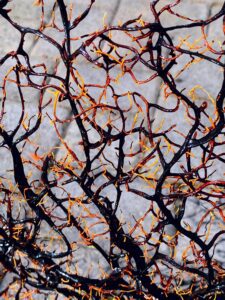Engagement is an essential expression of Dharma practice. If on the cushion is where we practice, it is in the collective where we perform. We can speak with kindness and truth. We can discern the strategic course and act with wise urgency. We can maintain steadiness with mindfulness practice, keep an open heart, and we offer all we cultivate to others. We can detach from outcomes. The means are our ends.
The movement for collective liberation wants mass participation, Dharma practitioners included. Dharma practitioners want for the collective liberation of all beings. We all have wonderful and weird gifts and abilities to offer the movement, and we all have much to learn and receive in return.
Climate change is perpetuated onwards by deeply unjust, historic, and entrenched global systems. Climate change is a form of structural violence against all beings, but most immediately harmful to Black, Indigenous, and people of color; communities of the Global South; and poor and working economic classes. Interdependence reveals suffering is shared, as is liberation.

Polycrisis: the global crisis greater than the sum of its parts. Climate change is a very serious ongoing consequence of polycrisis, but it is not the only consequence. Multiple, interlocked crises reinforce and worsen one another. The good and the bad news: We must change everything. No small task. We can only and must do so together. Here is how you can start:
Explore the ongoing consequences of polycrisis until you find the thread that most calls you. This may be climate change or ecological destruction, but this also may be mass incarceration, sexual and gender violence, labor inequities and exploitation, animal rights, migrants and refugees, reproductive rights, war, democracy, racial injustice, food insecurity, technology, and so on. Only you can answer the question, what societal problem calls me into action? What do I most want to help change? Check out Stop the Money Pipeline’s series Broadening our Ideas of Climate Justice.
Explore the different archetypes of action-takers for inspiration. There is no one to be, no one way to act. You may want to be a disruptor, or you may want to be a healer, a storyteller, frontline responder, or an advocate. Check out this Social Change Map from Deepa Iyer for more. Only you can answer the question, what role feels most aligned and authentic to me?

SM, © 2017 Deepa Iyer.
All rights reserved. All prior licenses revoked.
Check out the local organized action groups. Here are a few suggestions on how to get started:
- Do you know friends or family who are engaged in action? Ask them how you can get involved too.
- Recall groups you’ve seen recently in the news, on social media, in group chats, or active in your community and reach out.
- Do a Google search for “climate change” or “prison abolition” or “mutual aid networks” or “homelessness” or “whatever calls you” organizations in your city, town, or region. Check out their about us and get involved pages.
- Look up the topic on social media for related meetings, events, or upcoming actions.
- Pay attention to the flyers in coffeeshop windows, around parks, on light poles, and other community spaces.
Here are just a few examples of climate and ecological action groups with a global network of local organizations: 350.org, Third Act, Stop the Money Pipeline, and Extinction Rebellion.
Once you find a group, investigate their latest campaign. While no organization can offer a perfectly comprehensive solution to all that pains and oppresses, a good organization holds their role, owns their issue, and connects the dots between their chosen struggle and the broader struggle for collective liberation.
Still can’t find anything? Community is the foundation for all wise and strategic action. Gather your concerned, yet unorganized friends for a dinner, and have a conversation about visions of change in your local area. You could ask each other: how can we act for further justice in our community? What would feel meaningful to us? What are we uniquely positioned to do?
No community? This Vox article has great tips on how to find your community.
Supporting collective groups is important too. Most organizations rely on donations of money, materials, gathering space, food, and other resources, and amplification of their message across in-person and digital platforms. If you are unable to offer your presence, consider what you are willing and able to offer. Make it one-time, or make it recurring. Prioritize groups usually underresourced: youth; Black, Indigenous, and People of Color, (who else).
Keep up-to-date on local, national, and global injustice. Disinformation and mass delusion is a thread of polycrisis too. For global updates, we suggest following non-profit news outlets like Waging Nonviolence and Democracy Now! You can find more non-profit news sources here.
Skillful conversations are a cornerstone of EcoDharma practice. On the issue of climate change, one-on-one, personal conversations continue to be one of the most effective forms of action. Check out One Earth Sangha’s guide to skillful conversations here.
Individual actions matter too. Our daily, individual micro-actions have unseen effects that may impact other individuals, larger systems, and collective awareness. We’re more influential than we think.

On the issue of climate change, the Global North is responsible for 92% of excess carbon emissions. The world’s richest 10%, bracketed by an annual income of $40,000 USD or more, are responsible for 50% of global emissions. Check out this calculator for an estimate of your individual emissions. Then consider this list from Project Drawdown that suggests changes for your energy, eating, transportation, and heating/cooling habits. Ultimately, you are the only person that can decide which individual actions are right for you.
This is an ongoing, imperfect, and non-exhaustive resource. For more resources, please explore the list below:
Localization Action Guide: “A future in which Nature, justice and real democracy are nurtured, communities and local economies are rebuilt, and cultural and biological diversity thrive. These are among the benefits of economic localization – the most strategic path towards meaningful change.”
Social Change Now: “Social Change Now is a practical guide for those at every stage of their individual and organizational journeys towards justice, equity and solidarity. It introduces an ecosystems framework that includes ten roles that many of us play in service of our social change values.”